- Home
- Gerald Hammond
The Worried Widow
The Worried Widow Read online
THE WORRIED WIDOW
Gerald Hammond
© Gerald Hammond 1987
Gerald Hammond has asserted his rights under the Copyright, Design and Patents Act, 1988, to be identified as the author of this work.
First published in 1987 by Macmillan London Limited.
This edition published in 2018 by Endeavour Media Ltd.
Table of Contents
Chapter One
Chapter Two
Chapter Three
Chapter Four
Chapter Five
Chapter Six
Chapter Seven
Chapter Eight
Chapter Nine
Chapter Ten
Chapter Eleven
Chapter Twelve
Chapter One
In the echoing emptiness of what, according to the estate agents, had once been a coach-house, Keith Calder was reloading his pressure-barrel when his wife, heralded by a flood of daylight, came through the door. He sighed and raised one muff of his ear-protectors.
‘There’s somebody on the phone,’ Molly said.
Keith was both busy and absorbed. ‘Tell them I’m dead,’ he said shortly.
‘I can’t. I said I’d fetch you. And I wouldn’t have said that if you really were dead, now would I?’
Keith thought that she very well might have done so. Sometimes he thought that it was Molly’s mission in life to call him away from absorbing problems to take unwelcome phone-calls.
‘I’m too busy. Say I’ll call them back.’
‘I’m not telling any more lies for you,’ Molly said. ‘Not after telling Mr Wilmington you’d gone to Lerwick and you bumping into him five minutes later. It’s a lady, a Mrs Henderson,’ she added temptingly and gave a quick gurgle of laughter. ‘She asked if you were Keith Calder the private eye.’
‘Well, I’m not.’
‘You do investigate things,’ Molly pointed out.
‘I investigate things like burst gun-barrels,’ Keith said, ‘which is what I’m trying to do now to get your Mr Wilmington off my back. Anything else, she can go to one of the agencies.’
‘She sounded a nice-like body,’ Molly said. ‘But she seemed very upset. It’s about her husband’s death. The sheriff called it suicide and she said that he’d never do a thing like that.’
Keith fitted a cartridge into the breech of his pressure-barrel. This was bolted to a heavy table and pointed towards a large, steel plate which was angled to deflect the shot safely into a bed of sand. Keith had a dislike of small-shot ricochetting around in a confined space. ‘I’m not investigating any more crimes, firearms or no. Whenever I take on anything like that,’ he said, ‘something nasty happens.’ He turned his back and fitted a fresh lead ‘crusher’ pellet into the stirrup.
‘You usually manage to stop something worse happening. Shall I say you’ll come and see her?’
‘No, no and no!’ To emphasise his words, Keith slammed his hand down. The third smack caught the primitive trigger and the cartridge fired. Between stone walls, the crack of the discharge and the ring of the pellets against the steel plate were deafening. A fresh cloud of blue nitrocellulose smoke tainted the air. ‘Now see what you’ve made me do.’
Molly had retreated hastily out of the door. She came back and cupped her ear. ‘What?’
He raised his voice. ‘You said Henderson. Did you mean Hendrickson? Would that be Sam Hendrickson’s widow?’
Molly’s hearing was beginning to return. ‘I suppose so,’ she said. ‘I ought to have realised. What shall I tell her?’
‘She’ll have hung up by now.’
‘I don’t think so, she was too het up. Anyway, I have her number. I can call her back.’
‘You do that,’ Keith said. ‘Tell her I wouldn’t touch it with a barge pole. Shooting himself was the only good thing he ever did. But you needn’t put it quite like that.’
‘But suppose he really didn’t do it?’
‘Then I might find myself putting the finger on whichever public-spirited citizen knocked the bastard off. And I’d rather give him a medal.’
Keith’s reaction came as no surprise to Molly. He usually jibbed at any attempt to lure him out of the tight circle of his immediate enthusiasms. She offered a compromise. ‘I’ll tell her to come and see you at three o’clock,’ she said.
Keith threw up his hands. ‘You haven’t heard a bloody word I’ve said, have you?’
‘How could I, with you shooting off guns in my ear?’ Molly asked triumphantly. ‘If you want to turn her down, at least you can hear her out first and then tell her to her face. You might even be able to give her some useful advice.’
‘I’m seeing Wallace at the shop at three.’
‘I’ll phone Wal and make an excuse,’ Molly said firmly. Keith was going to see the lady and to take her case. Molly loved her husband in all his moods. If she should ever lose him, she would not know how to live on. But far, far worse was the image of his being branded a suicide. That would be the last straw, the final denunciation of a failed wife. No woman should have to face that.
*
An hour later when Keith, summoned by three peals on an electric bell, crossed the small courtyard and joined her for lunch in the blue-and-white kitchen of Briesland House, Molly’s dormant curiosity had had time to germinate.
‘Why were you so much against Mr Hendrickson?’ she asked. ‘What did he ever do to get up your nose?’
‘Nothing personal,’ Keith said with his mouth full.
‘He was quite a famous sort of person, wasn’t he?’
‘So was Hitler.’ Keith decided that he would only get peace to eat his meal if he kept Molly talking. ‘What do you know about him?’ he asked.
Molly put down her fork. ‘He was leader of one of the big Scottish unions,’ she said. ‘I’ve seen snippets about him in the papers now and again. And then there was a report of the Fatal Accident Enquiry in yesterday’s paper. It said that they’d moved here from Edinburgh after he fell ill, only three months ago. I mean that they moved here three months ago – he’d been ill longer than that. The sheriff – it was Sheriff Walker, the nice old man who kept looking down the front of my dress at Sir Peter’s Christmas party – decided that he’d taken down his shotgun and . . . and done it while he was depressed over his illness. Mrs Hendrickson heard the shot and found him. That must have been awful for her,’ Molly added breathlessly, visualising the scene and mentally embellishing it with a wealth of gory detail.
‘Messy,’ Keith agreed. He finished his plate and pushed it away. ‘It was more than just an illness, though. He’d had a stroke and was pretty badly incapacitated, which would be enough to push anybody in the direction of suicide. The sheriff decided that he’d done it while the balance of his mind was disturbed, which is a gimmick to permit his burial in consecrated ground. Not that Sam Hendrickson would have given a fart where he was buried, from what I’ve heard of him, but buried he was in the kirkyard a few days ago. But the point is, nobody could blame the widow for his doing it, so why would she be taking it so personally?’
‘Likely she’ll tell you when you see her,’ Molly said. ‘But nothing we’ve said sounds like a good reason for you to despise him so. I know you don’t like the unions, Keith, but it can’t just be that.’
Keith toyed with his coffee cup. ‘I’ve nothing against unions as such,’ he said. ‘I haven’t had a whole lot to do with them after being a one-man band most of my life.’
‘There’s Wallace.’
‘Wal’s a partner. So’re you and Janet. And although we do have the occasional, casual employee, the partners have never outnumbered the staff by less than two to one. From what little I know about unions,’ Keith said, ‘there are some very good and r
esponsible ones. I just think it’s time that some of the other kind forgot the Tolpuddle Martyrs and started acting in their members’ interests instead of out of hatred and prejudice. Sam Hendrickson was a prime example of the sort of hypocrite I mean. I never knew him and I’m only putting together a hundred different bits and pieces that I’ve heard or read over the years. But he came from a good home and had a good schooling, yet he was an out-and-out Marxist, dedicated to serving the communist cause whenever he could, usually at his members’ expense – and the more harm he did his own country’s economy, the better he was pleased. He lived better than most capitalists, with a swanky home and a big car and his children at private schools. What’s more, he didn’t live like that on his salary as general secretary of a medium-sized union.’
‘Yes. I can see why you and he might not have got on,’ Molly said, nodding. Keith, when he thought about politics at all, was right-wing and a fervent patriot.
‘There’s more. I’ve been hearing whispers. There was some big scandal brewing and only his illness was keeping it at bay. You can’t drag a man into court if his doctor certifies that he isn’t fit. If somebody did knock him off,’ Keith said, ‘I’d guess that it was something political, which I’m not equipped to deal with. Even if I wanted to, which I don’t. For that sort of thing, you need dozens of men, months of time, power to compel answers and the status to get search warrants.’
*
On the upper floor of Briesland House two large rooms, formerly bedrooms, were given over to Keith’s need for workshop space, storage and other overflow from the shop in Newton Lauder a mile or two away. A former dining room had also been made over into a study for his paperwork and occasional writings, but it was in the upstairs workshop, at a bench among the racks of antique guns, that Keith was gauging and tabulating the lead crushers from his morning’s work when Molly again interrupted him.
‘Mrs Hendrickson’s here,’ she said. ‘And – guess what? – I know her. She was Jenny Kerr and we were at school together. She was my senior but I remember her well. I’ve put her in the study and the kettle’s on. Are you coming?’
Keith put down his micrometer and noted a reading in his neat tabulation, but he made no move to get up. Instead, he swivelled his chair and looked out of the window, over the Borders scenery which reached to the town of Newton Lauder. Sunshine was settling warmth on to the bright greens of spring. Splashes of colour were appearing and he wished that he could get out with a gun and a dog. Such weather so early in the year could never be trusted to last until tomorrow. ‘Tell me about her,’ he said.
‘It was long ago,’ Molly said doubtfully. ‘She was liked without being really popular, if you know what I mean. I remember her as a quiet sort of person. She was good to be with. Not fun, she was too quiet to be fun, but she had a sort of contentment which rubbed off on you. And she was a trusting person who always thought the best of everybody.’
‘Soft?’ Keith asked.
‘In a way, I think she was. She was religious but she didn’t force it on you. Keith, do you think that that might be the reason why she doesn’t want to believe that her husband killed himself? Mortal sin?’
‘It could be. On the other hand, somebody with real faith would probably reason that God would know the truth and that what people thought didn’t matter.’ He looked round at his wife. ‘What do you think? As a practising heathen myself, I wouldn’t know.’
‘I wouldn’t know either,’ Molly said. ‘And, Keith . . .’
‘Yes?’
‘That inner tranquillity isn’t there any more. Help her if you can. She must be going through a bad time. Why don’t you go and introduce yourself while I put the tea in? Then you can judge for yourself.’
Keith shook his head. He knew his own limitations. ‘I wouldn’t know how to keep up a conversation with a recent widow-by-suicide I’ve never met before. You go and chat to her while I get the tea. See what impressions you can get.’
*
Tea was already set and Keith had only to fill the teapot and push the trolley across the hall. He found the two ladies exchanging news from the intervening twenty-odd years. He left the trolley at his wife’s side and waited patiently for their attention.
The widow could not have been more than a year or two older than Molly, but the years had not treated her so kindly. Molly was eternally a young woman, sometimes showing signs of middle age but as often, when happy or excited, she could have been taken for an attractive teenager. Mrs Hendrickson was inescapably middle-aged with only a soft voice, a cared-for skin and a shy smile to testify that she had ever been young. Her figure was getting out of hand, her hair was still thick but unashamedly greying and she wore a charcoal-coloured dress which he would have categorised, without being able to say why, as ‘old-wifey’. But, he supposed, it was unfair to judge her dress-sense by her mourning clothes. She had a likeable face which had never had pretensions to beauty and the soft lines of her features suggested good intentions rather than a high intelligence. One of those women, he realised suddenly, who are stamped out by the million and who form the unappreciated backbone of society.
He murmured a few platitudes as they shook hands and then took the swivel-chair behind the desk.
‘Molly tells me that you have a daughter,’ Mrs Hendrickson said. Children were evidently her prime topic.
Keith knew better than to try to change that particular subject. ‘Deborah will be taking her “O” levels soon,’ he said patiently. ‘She’s good at art. She wants to come straight into the business and develop her own speciality as an engraver, but we think that she ought to go to college first, and then go for a training period in one of the big workshops.’
Molly looked up from dispensing tea. ‘She has her own clients already,’ she said with quiet pride. ‘Sir Peter Hay brought her a photograph of his favourite dog chasing a rabbit and she’s copying it on to one of his guns. Not a very valuable gun, though,’ she added.
‘It’s a rubbish gun,’ Keith said. ‘But I’ve told him that the lockplates would fit his best game-gun. I’ll transfer them if she makes a job of it.’
‘Well, I think she’s making a lovely job of it,’ Molly said. ‘It’s in the workshop upstairs. I’ll show it to you later.’
‘I’d like that,’ Mrs Hendrickson said. Her face clouded. ‘It’s nice that she knows where she wants to go. I have two, you know, a boy and a girl, and neither of them has an idea in their head beyond motorbikes and discos and . . . and things.’
Keith saw his chance to lead the conversation gently around. ‘Are they here with you in Newton Lauder?’ he asked.
‘No, thank God.’ From her lips, the words only sounded devout. ‘They’re staying with the family of a schoolfriend in Edinburgh. Perhaps I’d better explain.’ She settled in her chair and cleared her throat nervously. ‘When poor Sam had had his stroke, I was finding it difficult to cope on my own. I’m not a businesswoman, Sam always looked after the decision-making and that sort of thing.
‘I still have two sisters in Newton Lauder, so I decided to move back here. My sisters and their husbands have been towers of strength, all of them. But I – we – didn’t want the children to change schools just now – Beth’s about to take her Highers and Michael’s at university. So we arranged for them to stay in Edinburgh during the week. Luckily, they were invited to a birthday party and stayed in Edinburgh on the day Sam died. They’ll be coming home for the weekend tomorrow, for the first time since that day. I didn’t let them come to the funeral. I . . . I don’t think funerals are good for the young, do you?’ she asked.
Keith thought back to the funeral of his own mother, on a bleak hill in a blizzard. The knowledge that she had been in that box had haunted him for weeks. He pushed the thought aside and hoped that it would drift away. ‘No,’ he said firmly. ‘I don’t. And your – er – Sam didn’t mind moving out of Edinburgh?’
She looked at him with soft eyes – like a spaniel, Keith thought. ‘I don’t think so,
’ she said. ‘It was hard to tell. His stroke left him paralysed all down the right side and his speech was badly affected. Poor Sam!’ She wiped away a tear. It was a real tear – Keith had watched it welling up. ‘It was hard to decide what it had done to his mind. There’s a nice sort of summerhouse place in the garden, with its own heating. It was ideal for him and he had all his things out there. Sam had his own computer, one just like yours –’ she looked at the microcomputer which sat on the side-table of Keith’s desk, the only modern element in a deliberately old-fashioned room – ‘and we brought it along. He could use it easily enough with one hand, as a sort of super-typewriter, and it saved him having to bother with putting paper in, and sometimes his old, lucid self seemed to be coming through; but, when it wasn’t, you couldn’t tell whether the barrier was mental or physical, or even whether he wasn’t putting it on because there was something he didn’t want to be bothered with.’
‘It must have been awful for you both,’ Molly breathed.
‘I honestly don’t think he was unhappy,’ Mrs Hendrickson said. ‘He had a friend next door, a Mr Strathling. Ben Strathling’s in insurance and Sam had done business with him in Edinburgh. Ben came to visit us after Sam had his stroke, to ask after him and to say how sorry he was, and when I said that I was looking for a house in Newton Lauder he told me that the house next to his was coming on the market. It turned out to be perfect, being all on one level for the wheelchair and midway between my sisters, and a shower cubicle for Sam – I couldn’t manage him in and out of a bath. It was terribly expensive, but we got far more than I’d expected for the Edinburgh house.
‘After we moved, Ben Strathling visited Sam almost every day. One or two other neighbours took to dropping in to chat to him and Sam seemed to be glad. He didn’t have many friends in Edinburgh.’
Or anywhere else, Keith thought. Sam Hendrickson had had the reputation of being a quarrelsome character with a savage tongue. But perhaps his illness had mellowed him. It had taken away the power of speech, and a good listener has a head start in any popularity contest. ‘Did the doctors offer him any hope of recovery?’ he asked.

 Home to Roost
Home to Roost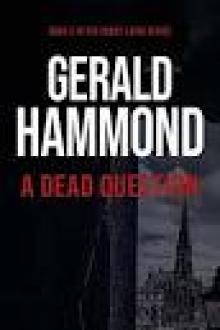 A Dead Question
A Dead Question Twice Bitten
Twice Bitten The Curse of the Cockers
The Curse of the Cockers In Loving Memory
In Loving Memory Illegal Tender (Three Oaks Book 12)
Illegal Tender (Three Oaks Book 12) Cold Relations (Honey Laird Book 1)
Cold Relations (Honey Laird Book 1) A Brace of Skeet
A Brace of Skeet Silver City Scandal
Silver City Scandal Sauce For the Pigeon
Sauce For the Pigeon Cold Relations
Cold Relations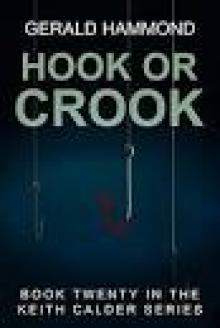 Hook or Crook
Hook or Crook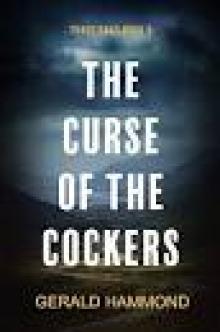 The Curse of the Cockers (Three Oaks Book 5)
The Curse of the Cockers (Three Oaks Book 5) Snatch Crop
Snatch Crop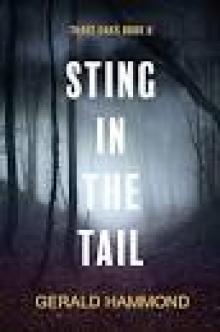 Sting in the Tail (Three Oaks Book 6)
Sting in the Tail (Three Oaks Book 6)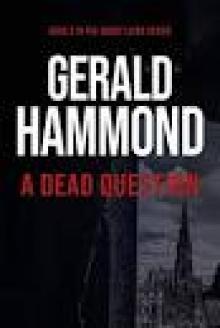 A Dead Question (Honey Laird Book 2)
A Dead Question (Honey Laird Book 2)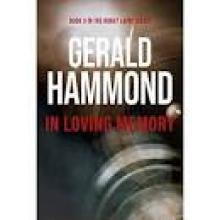 In Loving Memory (Honey Laird Book 3)
In Loving Memory (Honey Laird Book 3) Thin Air
Thin Air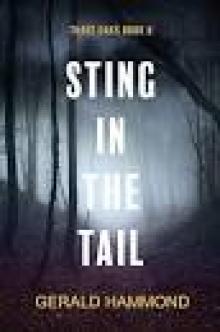 Sting in the Tail
Sting in the Tail Pursuit of Arms
Pursuit of Arms The Game
The Game Give a Dog a Name (Three Oaks Book 4)
Give a Dog a Name (Three Oaks Book 4) Fair Game
Fair Game The Executor (Keith Calder Book 10)
The Executor (Keith Calder Book 10) Whose Dog Are You? (Three Oaks Book 2)
Whose Dog Are You? (Three Oaks Book 2) Mad Dogs and Scotsmen (Three Oaks Book 7)
Mad Dogs and Scotsmen (Three Oaks Book 7) Cousin Once Removed
Cousin Once Removed The Worried Widow
The Worried Widow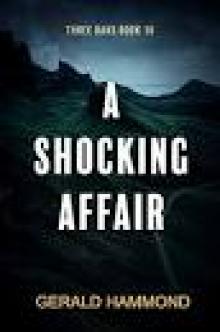 A Shocking Affair
A Shocking Affair Dead Weight (Three Oaks Book 11)
Dead Weight (Three Oaks Book 11) Whose Dog Are You
Whose Dog Are You The Revenge Game
The Revenge Game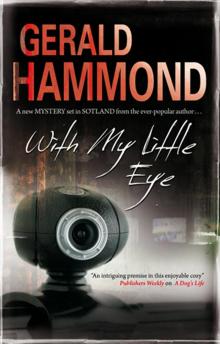 With My Little Eye
With My Little Eye Doghouse (Three Oaks Book 3)
Doghouse (Three Oaks Book 3) In Camera
In Camera Bloodlines (Three Oaks Book 8)
Bloodlines (Three Oaks Book 8)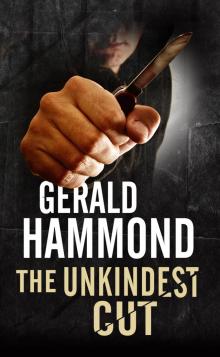 The Unkindest Cut
The Unkindest Cut